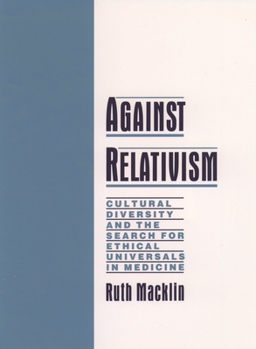Against Relativism: Cultural Diversity and the Search for Ethical Universals in Medicine
This book analyzes the debate surrounding cultural diversity and its implications for ethics. If ethics are relative to particular cultures or societies, then it is not possible to hold that there are any fundamental human rights. The author examines the role of cultural tradition, often used as a defense against critical ethical judgments, and explores key issues in health and medicine in the context of cultural diversity: the physician-patient relationship, disclosing a diagnosis of a fatal illness, informed consent, brain death and organ transplantation, rituals surrounding birth and death, female genital mutilation, sex selection of offspring, fertility regulation, and biomedical research involving human subjects. Among the conclusions the author reaches are that ethical universals exist but must not be confused with ethical absolutes. The existence of ethical universals is compatible with a variety of culturally relative interpretations, and some rights related to medicine and health care should be considered human rights. Illustrative examples are drawn from the author's experiences serving on international ethical review committees and her travels to countries in Africa, Asia, and Latin America, where she conducted educational workshops and carried out her own research.
Format:Hardcover
Language:English
ISBN:0195116321
ISBN13:9780195116328
Release Date:March 1999
Publisher:Oxford University Press
Length:304 Pages
Weight:1.10 lbs.
Dimensions:1.0" x 5.8" x 8.5"
Customer Reviews
0 rating





